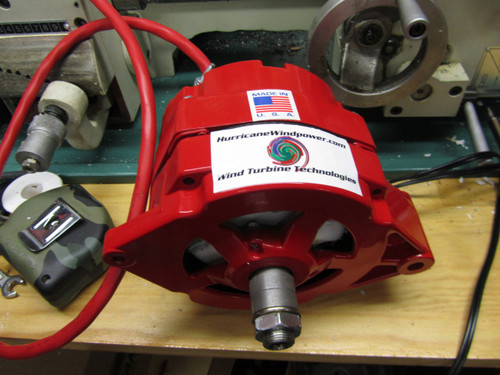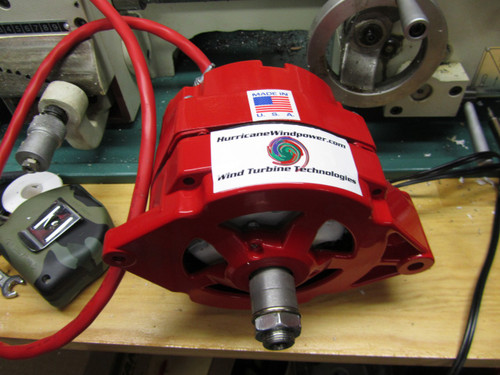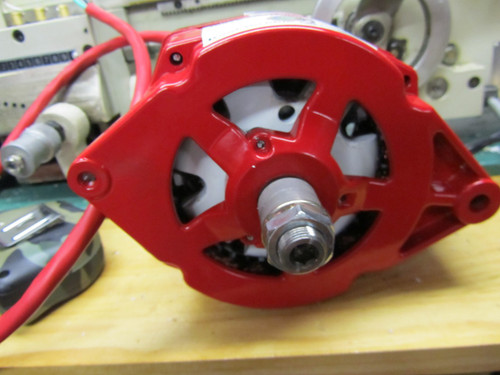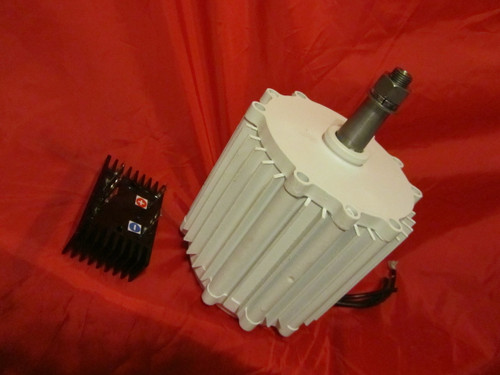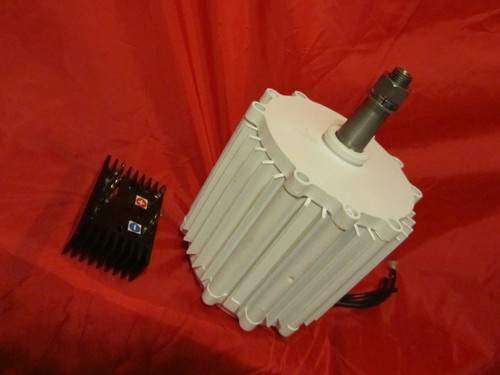Product Description
My apologies for the lengthiness of this description. My review of the generator sales has led me to the conclusion that most of the current market has to offer is "sales pitch". It is my intent to simply show here what we offer, our capabilities, and the methodology behind our designs. While some information is proprietary we feel the basic information should be available to the discerning customer whom is attempting to decipher fact , from fiction, weird science and smoke and mirrors.
Why buy from Hurricane?
This is probably the most frequent questions anyone in business is asked.
We have outlined the pertinent information in bulleted segments. We explain the methodology last. If you are new to wind power you should read the section and watch the videos in the embedded playlist if you are interested in the science behind the products . I recognized that understanding the basics is important. Many customers are interested but other just want the shortened version with the specs and pertinent information.
As intelligent consumers we are aware that you know bolting an imported generator to a body does not mean it is made and manufactured in the USA and anyone can show a meter on a video. So see the below video showing actual loaded power production ...Can we help out with the light bill?
- Wind generators are for the most part rated at the top end on power curves at wattage values. Many companies simply ignoring the 24.9 MPH power rating set by the Nation Research Energy Laboratory. The only thing that is important when selecting a permanent magnet alternator is which one will produce the most power over time. Since our beginnings we have held true to this principle which essentially holds that the majority wind generators available do not reach cut in speeds or produce so much as a trickle charge in low wind. Hurricane Low Wind PMA's have the ability to reach cut in i.e produce power when other products are simply big pinwheels in your yard.
For even more powerful permanent magnet alternators check out our NEO CORE Twin output (TM) and Air Boss Axial Flux APMA's
The vast majority of the country is in a low wind zone lighter shades of blue or white.... if this is your area you should consider this PMA. If you are blessed with higher wind speed average consider our Mark II or III with heavier windings.
- Our PMA's will reach cut in speeds and produce power in and low as 6 mph wind and we can demonstrate this. The below video features our dual PMA wired in series not the single PMA therefore the output would be roughly half or twice the RPM to achieve the RPM you are viewing in the video
- In my experience most customers do not care about an open voltage times shorted amps chart value calculated in 70 mile per hour winds. For these reasons we offer the open voltage multiplied by shortage amp style chart, The wattage output VS wind speed at battery bank environment, and monthly power output in KW hours per month to provide a comprehensive illustration of the capabilities of our products. Many power curves and charts are fiction i.e made, Mythical and comical.
- Open voltage multiplied by shorted amps do not give the customer a realistic perception of how much power a product will output. The two conditions are separate, open voltage measurements are not taken under a load while shorted amp readings are. This information is useful for some purposes but virtually useless for others. If you are interested we have charted the Cat 4 Mark IPMA in that format as well.
- Hurricane manufactures its own PMA's no vendor is used, it is not imported, and is designed, manufactured and assembled in Roanoke Virginia USA. Since we make stock and assemble the product we have control over the warranty process. All products whether they are built by myself, a third party vendor, or simply imported will have issues. This is the way of the world and the is simply no way around it. People, nor material goods are free of imperfection. The issue becomes how a company deals with and customer service issues which arise.
We are willing to go the extra mile. We will meet or exceed anyone's warranty in the business. We have the parts in stock and if something goes wrong with you product we are not faced with the decision to take the "hit" and throw the product in the dumpster. Logically speaking, if we can build it we can repair it.
Dual PMA shown performing under water
- Power output is limited to the power input of the old worn out drill but you get the point.
- The ability of to cool with an open design is very important due to the fact closed sealed PMA's will lose power from the buildup of heat and eventually fail due to the stator inability to dissipate heat burning up windings. It is really a point of common sense. If you were in a hot metal box would you rather have it sealed with a cooling fin attached to the outside of your box or have a window open?
The following is written with the intent of addressing wind applications but many of the principles apply to electromagnetic - mechanical transfer of energy in general. I apologize in advance for the length of the explanation but in the interest in the health of my jaw joint and phone bill, I will attempt here to lay out the basics as many of my new to the field. My customers want information and facts not puffery exaggerated, claims and “fantastic assertions”.
How a Wind Generator works
The science is what it is and we will tell you exactly why you should buy from Hurricane. The majority of what you have read while shopping for a wind generator PMA is fiction as I have eluded previously. We have inserted the following playlist so you may see the science behind the products if you are new to the field.
- Kinetic Energy transferred from the wind striking a surface, typically a set of blades is transferred to a generator. In the vast majority of all designs a magnetic rotor rotates around a stator a set of stationary coils, or the stator rotates around a stationary rotor. The force measured in torque eg. Ft/lbs, Newtons, Joules ect. that is transferred to the generator is changed in form from mechanical energy to electrical. Power input from a source has nothing to do with the generator or permanent magnet alternator but ultimately dictates the maximum power than may be output by a generator. This is why wattage rating without understanding input torque needed leads many to disappointment. Fast forward about 3 minutes in for the significant of the illustration
The law of conservation of energy applies “ energy can neither be created nor destroyed but change form eg kinetic to mechanic, mechanical to electrical" ect.
Simply stated it takes power to make power. To achieve maximum power from a wind generator the two elements which are of the essential are the amount of power or torque input from a source or blades set, and the efficiency of the generator.
The circumference of the rotor area, number of blades are some of the variables which determine torque produced from a given rotor/blade set. The input torque eg. Maximum mechanical energy input is relative to the amount of electrical energy that can be extracted from generator. These same principle of torque input apply whether we are speaking of a wind generator, hydro, gas, diesel or any other power source which drive a permanent magnet alternator. In other words it takes power to make power
Myth… the claw or zig zag design in a permanent magnet alternator is inferior?
About Rotors Why the claw shape is superior....
The rotor has 7 poles sets distributed as "claws" around it's circumference. One set of claws is thus a "north" pole and the other set is a "south" poles. The epoxy coated N 45 neo core magnet In Hurricane Rotors deeply saturates the stator. The iron originally used in the pole claw has been replaced utilizing higher efficiency shapes and forged steel a used in Hurricane permanent magnet alternators. The magnetic flux lines within the rotor are largely constrained to flow from one pole to the other through the claw structures at each end trapezoidal claw, folding around the internal magnetic structure and passing between the claws through a zig-zag shaped circumferential air gap. There is no reverse flux flow through the rotor shaft itself. The rotor shaft is magnetically entrained and acts as yet another part of the rotor Magnetic rotor.
The shape of the zig-zag gap between the claw pieces, being air and much less permeable than the forged steel and directs the magnetic flux into a similar zig-zag shape. So as the rotor rotates there will be a position where this gap exactly bisects a stator segment and both the "north" and the "south" claws on either side of the gap will have an equal magnetic influence on it. As it continues to rotate more and more of the "north" or "south" claw will come adjacent to this particular stator coil, thus transferring the particular magnetic field polarity into it. This zig-zag "claw" design therefore prevents abrupt magnetic transitions from taking place in the stator segments as the rotor is turned. preventing abrupt transitions this elegant design thus largely eliminates any tendency to have a location, or a series of locations, where the magnetic path is more permeable and thus more attractive than adjacent locations. It is these variations in permeability around the circumference that are the cause of magnetic "cogging" in slotted magnet rotor designs.
Of three companies rotor we examine which use this design two of three used magnet to wide for the field which is highly inefficient causing huge losses, heat buildup, e.g. eddy current resistive effects. In other words opposing poles entering the same field essentially fight against each other We have examined multiple "plate and grove designs" and I as well as many customers have found that some of the companies offering this type of design build PMA which have a terrible cogging effect and provide virtually no low end power .
Faraday- Lenz Law
Systems do not like change!
The things that you should be concerned with when buying a generator for maximum efficiency are as follows.
1.Rotor design and strength……this is simple as strong as possible designed in a manner in which the shaft is not difficult to turn and is designed in a manner to promote cogging. Also there are poor designs on the market I have examine that has poles to wide for the fields thus making the PMA terribly inefficient.< font>
2. The air gap between the rotor and stator must be exact. This cannot be done be hand and should be done with precision to the 1000th of an inch to maximize efficiency
3. Stators should be wound with a gauge of wire and winding connection that is appropriate for the particular application. E.g. high wind, wind. Battery bank voltage environment e.g. 12, 24, or 48 volt or the set point for the grid tie you are using. We use 400 degree wire in out stators which will withstand the test of time and extreme conditions. There is nothing magical about a hand wound stator other that the manufacturer could not afford to have enough wound to his specifications and made per the requirement he desired. Moreover by having the buying power to have our product wound professionally the wind is tighter allowing more copper to be wound into areas withing the stator which have deep flux saturation.
4. CRAFTSMANSHIP all connections must be made professionally, products such as loctite used new parts forged with precision, A PMA is only as good as the person building it. If something does not fot precisely it is not good. Quality Control and balance of the rotating assembly not only effect performance they effect the longevity of a product. An out of balance product will wear the air gap between rotor and stator and guarantee a short bearing live.
5 Value. We pledge you will not find a better product for the money period.
Hurricane Learning LAB: if you are interested in the science behind the products here it is. No pitch nothing fancy it is what it is.
Finally I do not consider myself the ultimate authority on Physics if you have a PHD in your pocket and have feedback we would love to hear from you.
If your permanent magnet alternator manufacturer does not understand the principles contained within this playlist, they will be inept whether their task be manufacturing or importing. Perhaps it's time to consider a Hurricane.
Product Videos
Videos Hide Videos Show Videos
-

Hurricane Wind Power Generator
The Hurricane wind power generator cat 4 is a realistic breath...
-

Wind turbines for the beginner How to part one by Hurricane Wind Power
Wind turbines for the beginner How to part one by Hurricane Wi...
-

Hurricane Wind Power
Hurricane Wind Power High Efficiency PMA DJ Tony http://www.hu...
Custom Field
Product Reviews
1 Review Hide Reviews Show Reviews
-
12 volt permanent magnet alternator PMA Delco
Good unit. I have had one in service for 6 years on a waterwheel, 9 months a year. It runs at 350 RPM and will charge at about one amp, perfect to maintain my battery bank and build charge over night.











